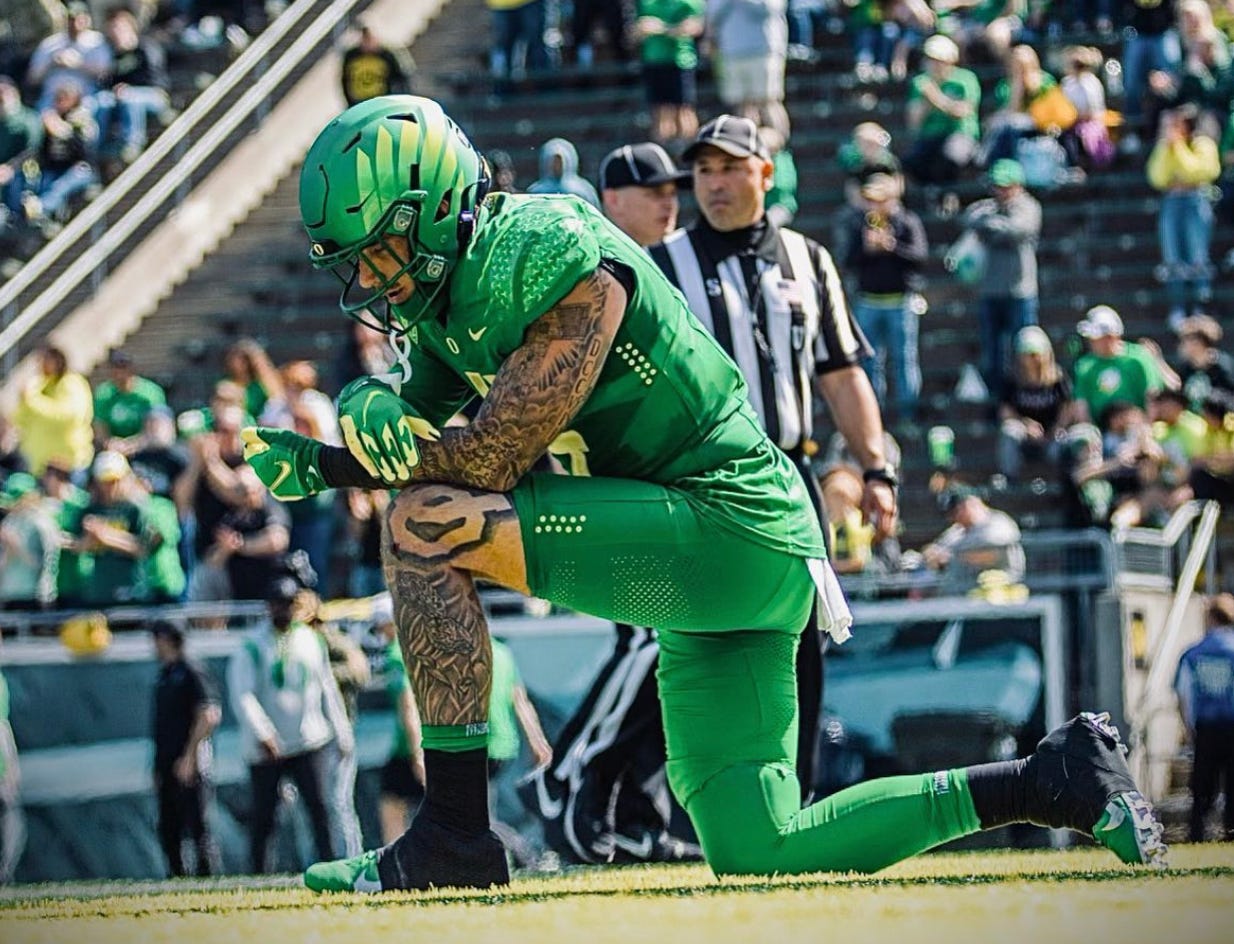Canzano: Spencer Webb's story deserved a better ending
Oregon Ducks' football player dead at age 22.
I don’t have a lesson for you today. I don’t have breaking news. I don’t have much that will make anyone feel better. Worst of all, there’s nothing I can write that will bring Spencer Webb back and unbreak so many hearts.
He died on Wednesday.
The Oregon Ducks’ football player was 22.
Webb came from a broken family. No mother around. No father, either. He was raised by his older brother, Cody, who became his legal guardian.
Other publications will focus on Webb, the football player. They’ll note that he caught 31 passes and scored four touchdowns at Oregon. They’ll point out that he was a devastating run blocker with soft hands, just what NFL scouts love to see in a 6-foot-6, 245-pound tight end. But you know what’s more important than any of that?
Spencer Webb — the person.
The most amazing thing about Webb is that he got to the University of Oregon in the first place.
“My mom walked out on me when I was very young,” Webb told a reporter when he was in high school. “They had substance abuse problems so that was pretty tough. My dad had substance abuse issues so he left me but he came back. I respect him for that. I look at my brother as my dad.”
Webb’s story is a remarkable real-life tale of perseverance. He drifted through a line of homes as a kid, living first with a family friend, before his aunt Fran and uncle Mark took him in and loved him up through grade school. Webb’s grades tanked in middle school. He got in trouble as a freshman in high school. Then, came that big brother and his wife, who put their arms around Spencer and tried to give him what he needed.
“Make curfew,” they said.
“Follow the family rules,” they offered.
“Get good grades,” his brother warned, “or no football for you.”
When Spencer Webb graduated high school, he carried a 3.4 grade-point average across the stage with him. College football coaches fell over themselves. He was offered scholarships by 13 different schools, including Oregon, Oregon State, Cal and a couple of Ivy League universities.
“Oregon,” he told anyone who would listen, “is my dream school.”
Webb was cliff diving near Triangle Lake on Wednesday afternoon. The Sheriff said he hit his head. Bystanders and paramedics couldn’t revive him. Lane County’s Search and Rescue team recovered Webb’s body 100 yards down a steep embankment.
Just like that — the kid who always wore a beanie cap — gone.
Did Webb slip? Or did he intend to dive? I’ll leave that to the investigators, but his death was ruled accidental. Word of it spread quickly on Wednesday and Webb’s coach, Dan Lanning, confirmed the somber news with a tweet.
“So full of life in every moment of the day,” Lanning wrote Wednesday night. “Your smile and energy will be missed Spencer. I love you!”
The shock and grief poured in on social media. Washington State coach Jake Dickert wrote on Twitter, “a life gone too soon.” Former Oregon running back LaMichael James heard the news and posted, “This can’t be real.” And Ducks’ head baseball coach Mark Wasikowski shared a note that captured Webb’s spirit: “Spencer Webb — dude hit me up every morning about how he would be our best pitcher.”
Former Oregon coach Mario Cristobal, now at Miami, heard about Webb and tweeted, “Love You. Will ALWAYS be Proud of you. Rest In Peace Brother.”
Webb is survived by his brother and sister-in-law, a girlfriend, classmates from his Sacramento-area high school, and a grieving college campus in Eugene. Former Oregon offensive coordinator Joe Moorhead told me: “Spencer was an incredibly positive and talented young man who could always brighten a room with a story and a smile.
“He will be missed.”
When I heard the news, my mind drifted to former UO defensive back Todd Doxey, who drowned in the McKenzie River in the summer of 2008. Then, to Oregon’s Terrance Kelly, who was gunned down just two days before football practices started in 2004. Then, I thought, too, about Jessie Nash, the Ducks’ basketball player, who died on Mother’s Day 1987 while tubing on the Willamette River.
Also, I thought about the tragedies that crushed Utah’s football program in the last couple of years. The Utes lost two players — Aaron Lowe and Ty Jordan — in separate gun-related incidents in less than 12 months.
I asked Utah coach Kyle Whittingham, “How did you and your team get through it?”
Whittingham said, “It takes everything you’ve got.”
Others will attempt to define Spencer Webb with his receptions and yards. They’ll embed video clips of him catching passes at Oregon and turn him into nothing more than a football player. The guy was so much more. He was a living, breathing example of a kid dealt a bad hand, who worked hard to rise above it.
Kids go to college. They study. They get a degree. Then, they come home. I think that’s what makes the end to Webb’s story especially painful. He was a kid without a home for so long.
His brother gave him one.
The University of Oregon did, too.
Thank you for reading. I appreciate all who have supported, subscribed and shared my new independent endeavor with friends and family in recent months. If you haven’t already — please consider subscribing.



Great piece John…. Thank you for focusing on Spencer’s unbelievable and courageous journey.
May Spencer now find peace with our Heavenly Father ….
John.. you created a special remembrance for a remarkable young man.
If Spencer Webb has a funeral.. I hope you appear and share your article with everyone in attendance.